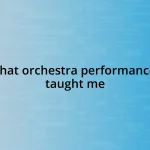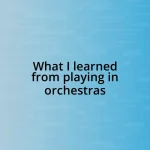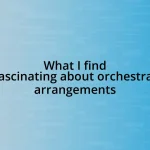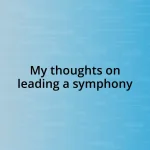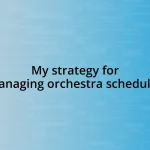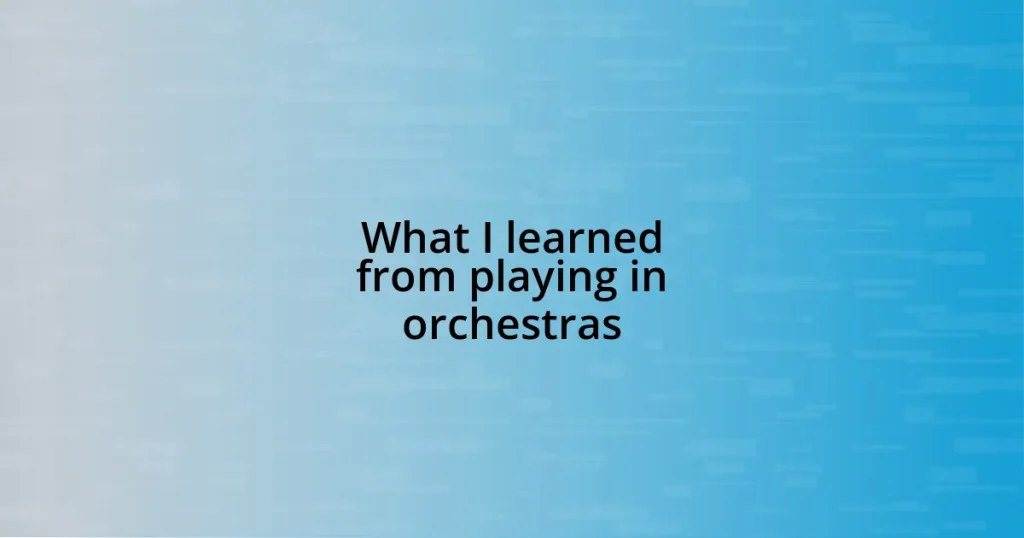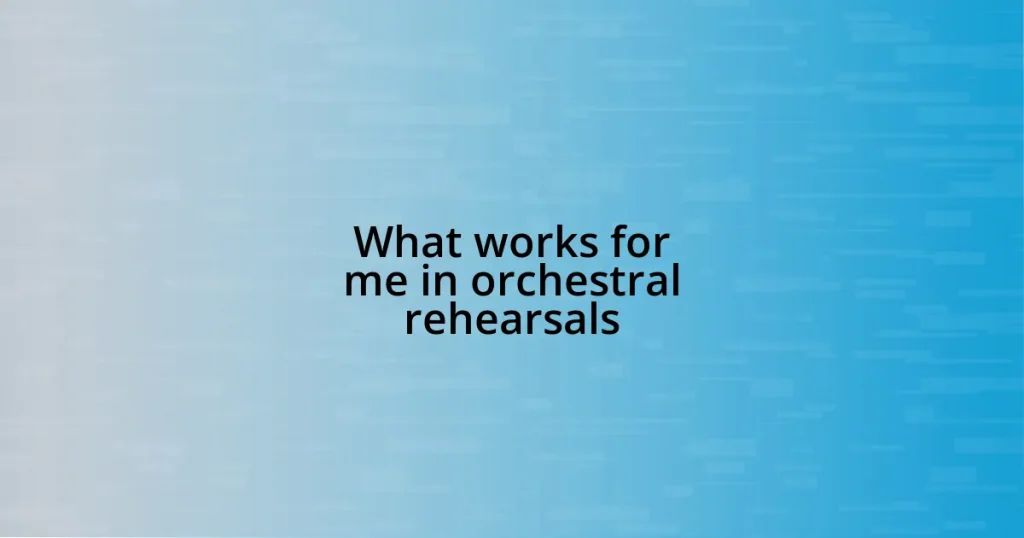Key takeaways:
- Playing in orchestras fosters a deep sense of community and belonging through shared musical goals.
- Participation enhances essential skills such as teamwork, discipline, adaptability, and effective communication in diverse settings.
- Leadership roles within orchestras, including the concertmaster’s position, highlight the importance of guidance, listening, and collective growth.
- Embracing challenges in orchestral experiences teaches valuable lessons on collaboration, resilience, and dedication that extend beyond music.

Benefits of playing in orchestras
Playing in orchestras truly fosters a sense of community that’s hard to replicate elsewhere. I remember my first rehearsal; the nervousness was palpable, yet as we began to play together, that anxiety transformed into an exhilarating sense of belonging. Isn’t it incredible how sharing a common goal—creating music—can unite individuals from all walks of life?
The discipline required for orchestra practice has taught me invaluable time management skills. Balancing rehearsals with schoolwork was challenging, but it instilled in me a sense of responsibility that I carry into my everyday life. Have you ever felt that rush of satisfaction when you finally master a difficult piece? That feeling of achievement drives me to tackle challenges head-on in other areas as well.
Lastly, performing in an orchestra enriches personal expression and enhances emotional intelligence. When I play, I’m not just hitting the right notes; I’m conveying stories and emotions that resonate deeply within me. Have you ever experienced a moment in music that made you feel understood? For me, those moments remind me of our shared humanity and the power of music to connect us.

Skills developed through orchestral play
Participating in an orchestra sharpens countless skills, many of which extend beyond music. For instance, when I first learned to listen actively to my fellow musicians, I noticed that it required a level of focus I hadn’t experienced before. That ability to tune into the nuances of others’ playing deepened my understanding of collaboration and heightened my sensitivity to my surroundings.
Here’s a quick list of essential skills developed through orchestral play:
- Teamwork: Working closely with fellow musicians fosters collaboration and a shared commitment to the performance.
- Communication: Non-verbal cues become second nature as you learn to connect with your peers through gestures and eye contact.
- Discipline: Regular rehearsals demand commitment, teaching resilience and the value of perseverance.
- Adaptability: Each performance brings unique challenges, encouraging quick thinking and flexibility in your approach.
- Listening Skills: Engaging with diverse instruments enhances auditory skills, allowing for a deeper appreciation of harmony and dynamics.
Every rehearsal was a lesson in merging my personal musical expression with the collective sound. I recall a particularly moving performance where our conductor encouraged us to let go of our individual styles and unify our interpretations. That challenge not only refined my playing but also taught me the art of submerging my ego for the sake of the group. The result? A breathtaking emotional experience that still resonates with me today.

Teamwork in musical ensembles
Working in an orchestra truly highlights the importance of teamwork in music. I remember one instance when we were preparing for a big concert, and the violins had to adjust their timing to align with the brass section. It was fascinating to see how each section relied on one another, essentially creating a musical conversation. I felt a rush of excitement knowing that our success hinged on our ability to listen and respond to each other; it taught me that collaboration extends beyond mere performance—it’s about mutual trust.
Another powerful lesson I learned about teamwork was during a rehearsal when a fellow musician shared her struggle with a difficult passage. Instead of isolating herself, she invited the rest of the section to work through it together, turning a vulnerable moment into a team-building exercise. This experience underscored the idea that sharing challenges not only strengthens the group but also fosters deeper connections among musicians. Reflecting on it now, I see how these moments of vulnerability can lead to incredible growth, both individually and as a collective.
I’ve also found that orchestral teamwork goes beyond the rehearsal room. The camaraderie we built carried through to our performances. I vividly recall stepping onto the stage, and the energy of having supporting musicians by my side made the experience incredibly enriching. It reminded me that in music—and in life—success is best celebrated together. The harmony we created wasn’t just from the music itself but from the relationships we nurtured as we worked towards a common goal.
| Aspect of Teamwork | Personal Experience |
|---|---|
| Collaboration | Aligned timing between sections leads to a great performance. |
| Mutual Support | Helping a fellow musician through challenges fosters team growth. |
| Camaraderie | Feeling united before a performance enhances the overall experience. |

Adapting to different musical styles
Adapting to different musical styles has always been an intriguing aspect of my orchestral experiences. I fondly remember one rehearsal where we shifted from playing a classical symphony to a lively swing piece. The transition was jarring at first, but it pushed me out of my comfort zone. How often do we get to experience such drastic shifts in expression? Embracing the contrasting rhythms of swing required me to rethink my technique while still maintaining the ensemble’s cohesion.
In another instance, I found myself playing in a chamber orchestra that specialized in contemporary works. At first, the avant-garde style felt foreign, almost intimidating. However, as I immersed myself in the unconventional harmonies and unpredictable rhythms, I started to discover new layers within my playing. It was an exhilarating moment when I realized that my expertise in classical music could coexist with these modern influences, enriching not just my performances but my musical identity overall.
I believe adapting to different styles taught me a valuable lesson about versatility in music—and life. Each genre has its own nuances and emotions; the key lies in being open and receptive. I often ponder how this adaptability mirrors our experiences outside of music. After all, aren’t we all navigating a blend of different “styles” as we move through various aspects of our lives? Embracing change not only enhances our musical journey but also fosters personal growth.

Overcoming performance anxiety
When I first joined an orchestra, the thought of performing in front of an audience was nerve-wracking. The key for me was recognizing that nerves are a natural part of the process. I recall a performance where my hands were shaking, and I thought, “Can I even get through this?” But as soon as I started to play, focusing on the music instead of the audience, I found solace in the familiar notes. This shift helped me channel my anxiety into a vibrant performance.
During my journey, I also discovered that preparation is crucial in overcoming these feelings of anxiety. I remember preparing for a particularly challenging piece that left me questioning my skills. In those moments, I leaned on my colleagues, practicing together until it felt second nature. There’s a profound sense of reassurance that comes from knowing you’re not alone. Isn’t that what being part of an orchestra is all about? Sharing the burden of performance not only calmed my nerves but created an environment where we all felt supported.
Another technique that helped me confront my anxiety was visualization. I’d often picture myself on stage, performing effortlessly with the ensemble, imagining the positive response from the audience. It felt empowering to visualize success instead of fixating on my fears. Have you ever tried this approach? I can tell you from experience that shifting my mental focus transformed my performances into joyful experiences rather than daunting challenges. Each of these practices has contributed profoundly to my ability to overcome performance anxiety, making every concert a celebration rather than a trial.

Leadership roles in orchestras
Within an orchestra, leadership roles serve as the backbone of the group, guiding musicians to unite for a common purpose. I remember my first experience as a section leader; initially, I felt overwhelmed by the responsibility. However, as I embraced the role, I found that clear communication and encouragement could inspire my colleagues. Isn’t it fascinating how taking on a leadership position not only benefits the group but also enhances one’s personal growth?
The concertmaster, a vital leadership figure, holds a unique position that intertwines musicianship with authority. I learned firsthand how crucial it was to maintain both technical excellence and social grace, particularly during rehearsals. One day, our concertmaster expertly navigated a tense moment when a disagreement erupted over tempo. Instead of picking sides, he facilitated a discussion that allowed everyone to voice their opinions. Reflecting on that day, I recognize that effective leaders don’t just direct—they listen and unify.
Moreover, I discovered that leadership within an orchestra isn’t confined to designated roles. On several occasions, I stepped up during rehearsals when our conductor couldn’t attend, leading warm-ups and encouraging my peers to share their insights. Suddenly, I understood that being a leader could manifest in simple acts, empowering each musician to contribute their voice. Have you ever considered how small gestures can create a ripple effect in teamwork? It’s truly inspiring to think that everyone can have a leadership impact, regardless of their title.
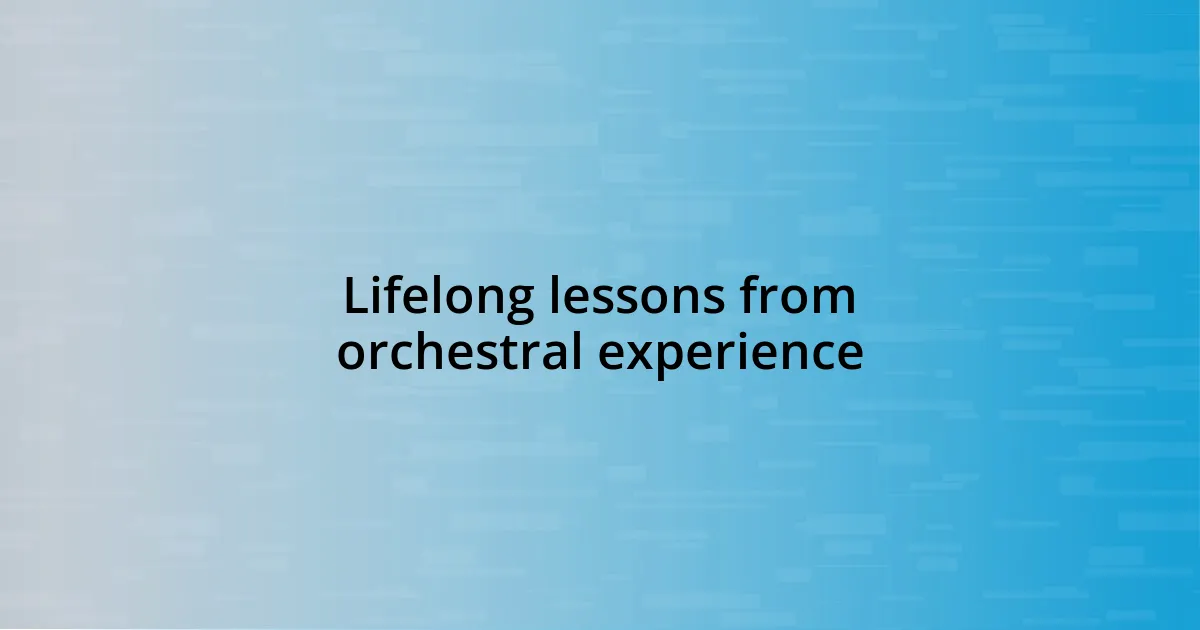
Lifelong lessons from orchestral experience
Throughout my time playing in orchestras, I’ve learned the power of collaboration. There was this one rehearsal where our sound just wasn’t coming together. Frustrated, I suggested we try playing sections at a slower tempo. To my surprise, the entire orchestra embraced the idea, and as we focused on listening to one another, the chemistry in the music flourished. It struck me that sometimes, stepping back and simplifying can lead to remarkable breakthroughs. Have you ever noticed how a little patience and teamwork can transform a challenging situation?
Another valuable lesson I absorbed is the importance of resilience. I recall a concert where our performance didn’t go as planned—mistakes rippled through the group like a wave, leaving us all feeling deflated. Instead of letting it affect the rest of our tour, we held a heartfelt discussion, sharing our experiences and frustrations. That moment of honesty not only reinforced my belief in our collective strength but also reminded me that it’s okay to stumble; it’s how we rise that truly matters. Can you relate to experiencing setbacks only to find they lead to growth?
Lastly, orchestral experiences solidified my understanding of dedication. I remember dedicating countless late nights to perfecting a particularly complex piece. The emotional investment I made transformed my perception of practice from merely physical work to a passion-driven journey. Each rehearsal became a stepping stone, not just toward mastering the music but also toward nurturing a deep appreciation for the craft. Isn’t it incredible how even the smallest efforts can yield profound results? Embracing this dedication has enriched my life beyond music, instilling a work ethic that spills into all areas I pursue.



